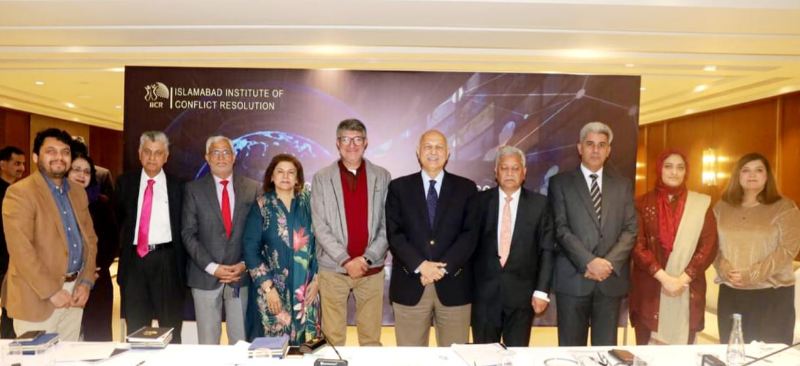Media experts call for digital literacy to combat misinformation epidemic

ISLAMABAD, DEC 23 /DNA/ – The Islamabad Institute of Conflict Resolution (IICR) convened an insightful seminar titled *“Decoding Media Influence: Global Perspectives on Information Perception and Society”. The event Seminar together prominent experts from academia, media, and public policy to discuss the profound impact of media on shaping societal and political landscapes in an increasingly interconnected world.
Moderated by Dr. Shabana Fayyaz, Associate Professor at Quaid-e-Azam University, the seminar featured a distinguished panel, including Ex. Senator Mushahid Hussain Syed, Dr. Nazir Hussain, Air Marshal (Ret.) Farhat Hussain, Ex. Information minister Murtaza Solangi, media expert Dr. Furqan Rao, and investigative journalist Fakhar Kakakhel.
In her opening remarks, Ms. Sabah Aslam, Executive Director and Founder of IICR, emphasized the critical relationship between media, public perception, and societal outcomes. She underscored the importance of fostering media literacy, promoting critical thinking, and encouraging responsible media consumption, particularly among youth. The seminar sought to examine media’s role in shaping narratives, countering misinformation, and fostering cross-cultural understanding.
Senator Mushahid Hussain Syed highlighted the EU Disinfo lab role in exposing India’s global propaganda campaigns, citing examples like the activities of ANI and the Srivastava Group.He noted the transformative power of Western media in shaping historical and contemporary events, from the 1953 Iranian coup to the Iraq War. Reflecting on the shifting dynamics of media during the 2024 U.S. elections, Senator Hussain called for a coordinated media strategy in Pakistan to address emerging challenges.
Murtaza Solangi, a seasoned journalist and ex federal minister, delved into the essence of journalism, advocating for the public’s right to know. He identified corporate influence, market forces, and non-state actors as significant challenges to media independence. He emphasized the global epidemic of misinformation, stressing the importance of digital literacy to combat fake news and prevent the suppression of voices through censorship.
Fakhar Kakakhel, an investigative journalist, pointed to the proliferation of “keyboard warriors” and the Western-backed spread of misinformation, linking these issues to efforts to undermine Pakistan’s progress, particularly regarding the China-Pakistan Economic Corridor (CPEC). He called for better mechanisms to address the digital chaos resulting from censorship and misinformation.
Dr. Furqan Rao, a media expert, warned against the dangers of political hate speech, which he said exacerbates social and cultural divisions. He advocated for a multidisciplinary approach to address media-related challenges and highlighted the need for widespread media information literacy to create an informed populace.
In his keynote address, Air Marshal (Ret.) Farhat Hussain underscored the necessity of exploiting Indian vulnerabilities that are often masked as strengths through media manipulation. He called for equipping individuals with critical thinking skills to discern truth from propaganda and recommended rationalized media regulations to manage the cross-border influence of media narratives.
Dr. Nazir Hussain, in his closing remarks, addressed the growing dominance of social media as a counterbalance to the restrictive practices of mainstream media. He attributed this trend to the corporate ownership of traditional media houses, which often limits the diversity of perspectives available to the public.
Key Themes and Takeaways
The seminar shed light on pressing global and national challenges posed by media influence, including the rise of misinformation, the weaponization of narratives, and the role of social media as an alternative to mainstream platforms. Panelists collectively stressed the urgent need for digital literacy, media regulation reforms, and the cultivation of critical thinking to navigate the evolving media landscape.
Related News

Security forces kill four Indian-sponsored terrorists in Kalat operation
RAWALPINDI, JAN 13 /DNA/ – Security forces conducted an intelligence based operation in Kalat DistrictRead More

Trump urges Iranians to keep protesting, says ‘help is on its way’
WASHINGTON, JAN 13: US President Donald Trump urged Iranians on Tuesday to keep protesting andRead More


Comments are Closed